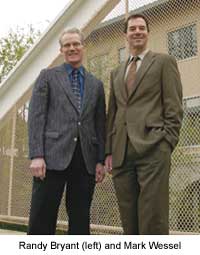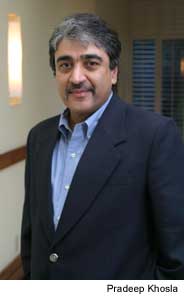Three of Carnegie Mellon University’s most prominent schools have new deans.
Randal E. Bryant was named dean of the School of Computer Science (SCS), Pradeep Khosla was appointed dean of the College of Engineering (CIT) and Mark G. Wessel was elevated to dean of the H. John Heinz III School of Public Policy and Management. Bryant takes over the nation’s No. 1 ranked computer science program. Khosla takes the reigns of the country’s 8th ranked engineering program, and Wessel will direct America’s No. 8 ranked public affairs programs.
Randal Bryant
Bryant, University Professor of Computer Science and former head of the Computer Science Department, succeeds James H. Morris, SCS dean since 1999, who stepped down to pursue greater involvement in Carnegie Mellon’s West Coast Campus.

Bryant, an SCS faculty member since 1984, achieved wide recognition for developing computer-aided design tools that simulate and verify digital circuits, and for his research in symbolic manipulation and parallel computation. Last year he was elected to the National Academy of Engineering for pioneering new abstractions for logic circuit simulation, especially the switch-level model for transistor circuits.
Among his many honors is the Kanellakis Award, which recognizes theoretical work in computer science that ultimately has an impact on the commercial world, and Carnegie Mellon’s Newell Medal for Research Excellence.
“Randy Bryant is the quintessential computer science professor,” said Carnegie Mellon President Jared L. Cohon. "He has done outstanding research that many companies depend upon to verify the basic soundness of their computer systems. He is also known for excellence in teaching and for creating exciting new courses of study for undergraduate students in computer science. He has been an outstanding department head and he will be a great dean."
In research Bryant is best known for developing switch-level chip simulation and ordered binary decision diagrams (BDDs). The MOSSIM simulator was the first tool that could efficiently model the logical behavior of very large-scale integrated (VLSI) circuits. Intel Corp. used the program for more than a decade in developing several generations of their microprocessors. Versions of the COSMOS simulator, which Bryant developed to succeed MOSSIM, are still being used at Intel and other companies.
Bryant is also co-author of a best-selling textbook which, for the first time, offers a core text that provides an integrated view of the hardware, software and networks that underlie computer systems. The book, "Computer Systems: A Programmer's Perspective," written in conjunction with SCS colleague David O'Hallaron, was published in 2002 by Prentice Hall. To date, more than 63 colleges and universities in the U.S. and another 15 abroad are using the book in their basic computer curricula.
Pradeep Khosla
Khosla, the Philip and Marsha Dowd Professor of Electrical and Computer Engineering, is head of the Electrical and Computer Engineering (ECE) Department, director of the Information Networking Institute (INI) and co-director of CyLab, a university-wide computer security initiative. He succeeds John Anderson as dean. Anderson stepped down last April to become provost at Case Western Reserve University.

“Pradeep’s wide-ranging experience in research, teaching and creating meaningful partnerships with business and industry make him an excellent choice to lead our College of Engineering,” President Cohon said. “Based on our past experience with his work, we expect great things of Pradeep.”
During his tenure as department head, ECE grew more than 80 percent in research volume, added 23 new faculty and defined several strategic multidisciplinary initiatives. The computer engineering graduate program was ranked number one for the first time by U.S. News & World Report in 2002.
Since October 2000, under his leadership the Information Networking Institute (INI) has increased its enrollment significantly and created a collaboration with the Athens Information Technology (AIT) Institute in Athens, Greece, to offer Carnegie Mellon's MSIN (Master of Science in Information Networking) degree. The program's first class graduated this spring.
Khosla’s research covers a broad swath of activity including a focus on cutting-edge technologies related to collaborating and distributed autonomous robotics systems, software composition and reconfigurable software for real-time embedded systems, and secure embedded software and information systems.
Provost Mark Kamlet said Khosla has been a leader in research and education and called his leadership of international education opportunities “striking,” citing his leadership of very successful programs in Greece and Singapore. Kamlet praised his work to redefine the engineering degree at Carnegie Mellon and his development of an introductory freshman course that encourages hands-on engineering activity to pique the interest of students in the field.
Mark Wessel
Wessel, acting Heinz School dean since February 2003, has served as director of health care programs, associate dean, senior associate dean and chief operating officer. He developed the Heinz School’s information technology management program, ranked No. 1 nationally by U.S. News & World Report.
“For more than a decade, Mark Wessel has provided consistent leadership and vision while serving the Heinz School in a wide variety of key posts,” said Kamlet, who was dean of the Heinz School from 1994 to 2000. “He will continue to build upon the Heinz School’s strengths, particularly at the intersection of policy, management and information technology.”
As dean, Wessel will direct the school's academic programs in public policy and management, health care policy and management, arts management, public management, medical management, educational technology management, and information security policy and management. He also will be responsible for academic programs in information systems and technology management and for six research centers.
The Heinz School has built an international reputation for excellence in educational programs and faculty research. Its programs in information technology, criminal justice policy, policy analysis, finance and environmental policy are respected across the nation and internationally as among the elite. Programs in health care and medical management, educational technology and other areas continue to grow and take national prominence.



